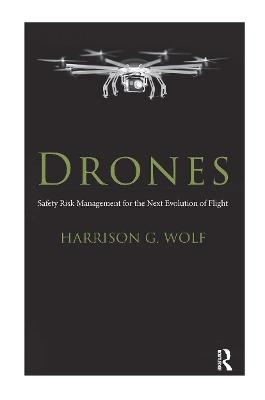
Drones
Routledge (Verlag)
978-0-367-66989-8 (ISBN)
This book is an everything-included approach to understanding drones, creating an organization around using unmanned aircraft, and outlining the process of safety to protect that program. It is the first-of-a-kind safety-focused text book for unmanned aircraft operations, providing the reader with a required understanding of hazard identification, risk analysis, mitigation, and promotion. It enables the reader to speak the same language as any civil aviation authority, and gives them the toolset to create a safety risk management program for unmanned aircraft.
The main items in this book break down into three categories. The first approach is understanding how the drone landscape has evolved over the last 40 years. From understanding the military components of UAS to the standards and regulations evolution, the reader garners a keen understanding of where we came from and why it matters for moving forward. The second approach is in understanding how safety risk management in aviation can be applied to drones, and how that fits into the regulatory and legislative environment internationally. Lastly, a brief synopsis of the community landscape for unmanned aircraft is outlined with interviews from important leaders and stakeholders in the marketplace.
Drones fills a gap in resources within the unmanned aircraft world. It provides a robust understanding of drones, while giving the tools necessary to apply for a certificate of authorization, enabling more advanced flight operations for any company, and developing safety risk management tools for students and career professionals. It will be a mainstay in all safety program courses and will be a required tool for any and all individuals looking to operate safely and successfully in the United States.
Harrison G. Wolf has been on the cutting edge of unmanned aircraft system safety development since 2010. He created the University of Southern California’s Safety Management Systems for Remotely Piloted Aircraft Course and is the President of an internationally recognized consulting company, Wolf UAS LLC. Harrison continues to teach at the University of Southern California, USA and provide leadership in the robotics sector.
Introduction
1 A quick history of drones
Case study: NASA’s unmanned organizational flaws
2 Technology adoption: A story of war and economics
Case study: The Yamaha RMAX2
A revolutionary technology on an evolutionary path: An interview with Michael Toscano
3 International standards and regulations
Case study: Examples of international regulations
4 Domestic regulations, standards and the FAA roadmap
Case study: The role of industry consensus groups – ASTM and RTCA
We’ve got to know where we’ve been to know where we’re going: An interview with Johnny Walker
5 Concept of Operations: One size does not fit all
Case study: One size does not fit all
6 How to be safe and legal: SMS for remotely piloted aircraft
Case study: Risk assessment checklist for sUAS operations
Lessons learned in blood must not be forgotten: An interview with Thomas Anthony
7 The States Act and privacy implications for drones
Case study: The privacy dilemma – The Constitution and case law
8 Developing a community
One message may not fit all: An interview with Gretchen West
| Erscheinungsdatum | 01.10.2020 |
|---|---|
| Verlagsort | London |
| Sprache | englisch |
| Maße | 156 x 234 mm |
| Gewicht | 300 g |
| Themenwelt | Technik ► Fahrzeugbau / Schiffbau |
| Technik ► Luft- / Raumfahrttechnik | |
| ISBN-10 | 0-367-66989-7 / 0367669897 |
| ISBN-13 | 978-0-367-66989-8 / 9780367669898 |
| Zustand | Neuware |
| Informationen gemäß Produktsicherheitsverordnung (GPSR) | |
| Haben Sie eine Frage zum Produkt? |
aus dem Bereich


